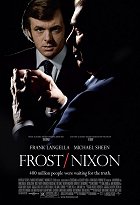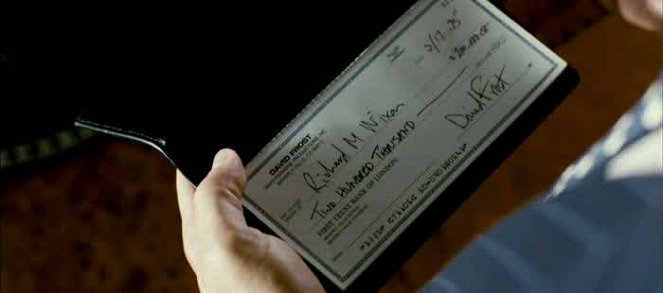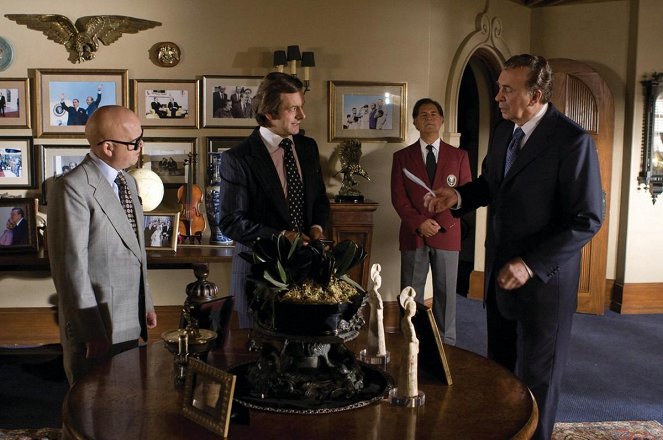Directed by:
Ron HowardCinematography:
Salvatore TotinoComposer:
Hans ZimmerCast:
Frank Langella, Michael Sheen, Sam Rockwell, Kevin Bacon, Matthew Macfadyen, Oliver Platt, Rebecca Hall, Toby Jones, Andy Milder, Kate Jennings Grant (more)VOD (1)
Plots(1)
Oscar-winning director Ron Howard brings to the screen writer Peter Morgan's electrifying battle between Richard Nixon, the disgraced president with a legacy to save, and David Frost, a jet-setting television personality with a name to make, in the untold story of the historic encounter that changed both: Frost/Nixon. Reprising their roles from Morgan's stageplay are Frank Langella, who won a Tony for his portrayal of Nixon, and Michael Sheen, who originally played the part of Frost onstage in London and New York. For three years after being forced from office, Nixon remained silent. But in summer 1977, the steely, cunning former commander-in-chief agreed to sit down for one all-inclusive interview to confront the questions of his time in office and the Watergate scandal that ended his presidency. Nixon surprised everyone in selecting Frost as his televised confessor, intending to easily outfox the breezy British showman and secure a place in the hearts and minds of Americans. (Universal Sony Pictures Home Entertainment)
(more)Videos (3)
Reviews (13)
With this Oscar contender I have the same problem as with all other films by Howard, technically it’s flawless, but the emotional effect on me is zero. Those two hours went by nicely, the Frost-Nixon interview was great, but I don’t feel like watching this film ever again. If I had to compare it with this year’s other big political drama (Milk), Frost/Nixon would win by a long shot because I felt that this one at least knows what it Is about, while Milk felt very empty.
()
Just the idea of making this like a boxing match with a “former world champion vs. a talent who remained in the limelight" is excellent. On the one hand it is a fight for atonement/forgiveness and on the other for an admission/apology. Sheen acts so well and he doesn’t let the phenomenal Langella steal the movie. But still, it has its faults. It is still just a regular Howard movie. In other words, a simplified fairytale, this time political. But the list of factual sins is just too long (and not just what the IMDb reviewers mentioned). Primarily Nixon’s tirade during his nighttime phone call, this scene is like comic book movies where the most villainous ever villain reveals his complete plan (including the weaker bits) for conquering the world. I understand that from a movie point of view this is essential and needed, but then the result is unavoidably fiction which has nothing to do with reality. I personally think that to leave out that phone call and stay with the real state of affairs would have been better. It would at least leave room for viewer imagination about whether Frost really got Nixon down on the floor on his own or whether this wasn’t just another brilliant move by Nixon, letting him leave the scene maintain a little self-respect and, in a way, fame.
()
Of the films with Peter Morgan's screenwriting signature that I've seen so far, Frost/Nixon is unfortunately one of the weaker ones. On the one hand, there are perfect performances by Frank Langella, Michael Sheen, Sam Rockwell, and Kevin Bacon, and a neat documentary atmosphere. On the other hand, the characters are pretty much useless, including (unfortunately) Rebecca Hall, whose purpose I didn't fully understand, and some off-camera scenes are barely believable, for example, the late-night phone call. I guess the original stage play is more concentrated, and thus probably better.
()
It's not often that a Hollywood studio reaches for socially significant material and allows for the creation of a film that deviates from the established templates of comic book adaptations, romantic and family comedies, or other entertainment genres. Frost/Nixon is an exceptionally successful film from a technical standpoint, with careful casting, a quality screenplay, and thoughtful direction. If there is a challenge somewhere, it lies in the subject matter itself, in what the creators see as crucial, and what they want to communicate. In reality, Frost/Nixon is not a film about politics and a controversial but influential figure of the time. It is about the role of the media, specifically television, which took on a decisive influence in shaping public opinion in the second half of the 20th century. It is no coincidence that the film repeatedly mentions the famous television debate between Kennedy and Nixon, where Nixon's defeat was decided by the sweat on his face, which appeared unpleasing on camera and made Nixon look older. The decisive moments of Nixon's scandal took place out of the television cameras' view. The ant-like work of investigators, investigative journalists, and behind-the-scenes negotiations of lobbyists during the impeachment process was all beyond the scope of this film as if it didn't exist. By the time the film's story takes place, Nixon was already out of the game, and the duel with Frost was merely a symbolic end to his tenure in office. The televised duel at the political level did not signify a significant turning point, and Nixon continued to publicly function as a private individual and a veteran of the Republican Party, which even considered resurrecting Nixon and his re-candidacy after Ronald Reagan's second term. Frost was and remained just an entertainer who made a mark in media history by managing to bring these events back to television screens and turn them into a major hit several months after the government scandal and the president's resignation. Frost approached the interview as an opportunity to gain visibility and make money. He didn't understand politics, but he knew and understood television as a medium very well. Overall impression: 80%.
()
My Oscar favourite this year. After the awful The Da Vinci Code, Ron Howard must have had a fit of creativity and I applaud him. This film is one of the best political dramas in many years. It is engagingly shot, not boringly descriptive, on the contrary, through an interesting verbal TV duel between the two leading characters, it presents the socially tense period after the biggest stain on the political culture of the history of the United States, the Watergate affair (when a large part of the American society could not stomach Ford's amnesty on Richard Nixon's transgressions). With his piercing gaze, thoughtful diction and mesmerizing confidence, Frank Langella is about ten times more devilish than Nixon himself, and I hope he has a pleasant Oscar night.
()



Ads